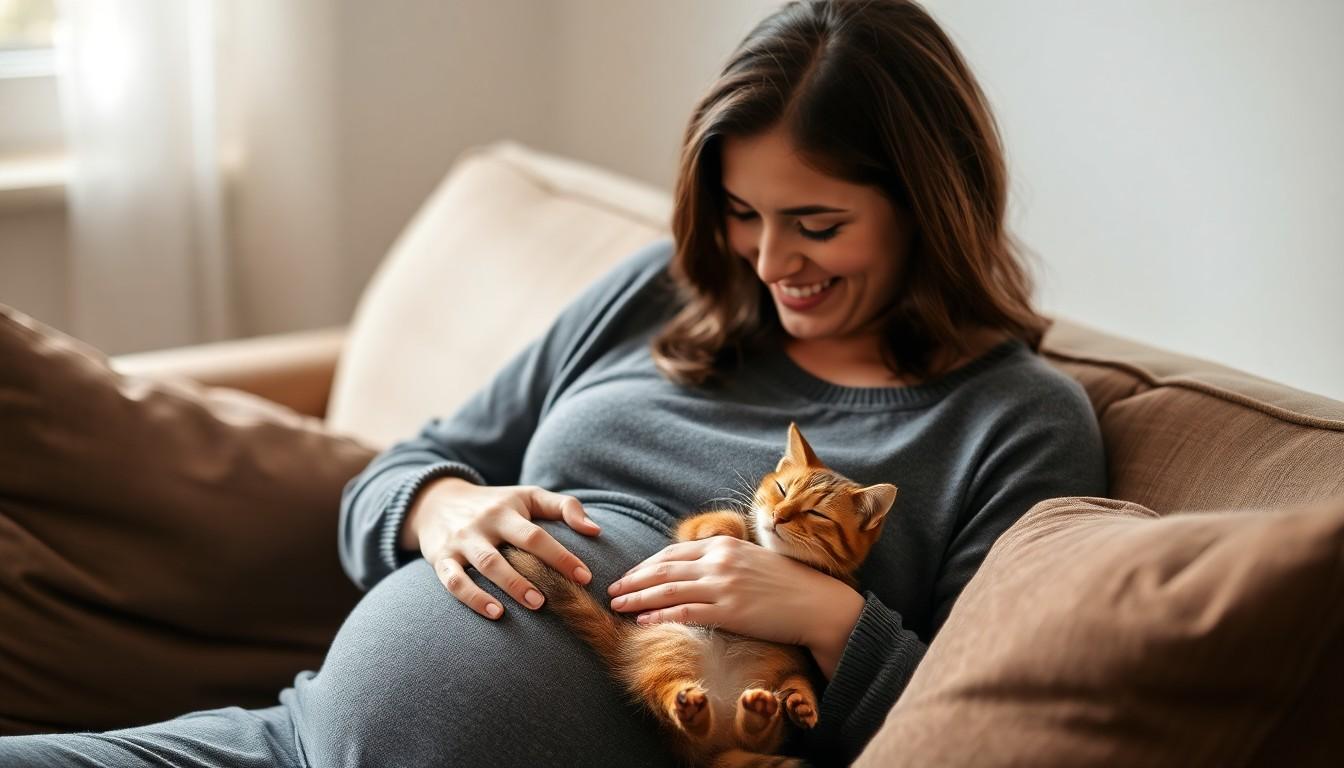Cats have a reputation for being mysterious creatures, but when it comes to sensing pregnancy, their intuition might just take the cake. Ever noticed how your feline friend suddenly becomes more affectionate or a bit clingy? It’s not just a coincidence—there’s a chance they’re picking up on those subtle changes in your body and behavior.
Imagine your cat strutting around like a tiny furry psychic, ready to offer comfort during those nine months of cravings and cravings. They might not be able to help with the nursery decor, but their instincts could provide a unique insight into your growing family. So, what’s really going on in that little head of theirs? Let’s dive into the fascinating world of feline intuition and discover if cats truly can sense pregnancy.
Table of Contents
ToggleUnderstanding Cat Behavior
Cats display unique behavioral patterns that often change in response to their owner’s condition. Increased affection can manifest as a cat seeking more physical closeness during pregnancy. This behavior serves as a social bond that strengthens between felines and their humans.
Clinginess may also arise, with cats staying near their pregnant owners. Cats possess heightened senses, allowing them to detect subtle changes in human pheromones. Elevated hormones and altered body chemistry during pregnancy might trigger a cat’s instinctual responses.
Attention towards their pregnant owners can include nuzzling and purring more frequently. Cats might also exhibit protective behavior, positioning themselves close to their owners for security. Observing these changes offers insight into feline intuition and their capacity to sense shifts in environment.
Vocalization may become more pronounced as cats attempt to communicate with their owners. Increased meowing or chirping often coincides with the owner’s altered state. Each cat is different, and behavior varies widely based on individual temperament.
In addition to affection, some cats display signs of curiosity. Investigating the owner’s changing body shape or routine exemplifies their awareness. Cats may also adapt their play patterns, showing less interest in rough play or becoming more gentle.
Monitor interactions closely to gain a better understanding of these behaviors. Noticing these changes can foster deeper connections between cats and their owners during pregnancy. Those behaviors highlight the fascinating relationship and communication between cats and humans.
Do Cats Sense Pregnancy?

Pregnant individuals often report changes in their cats’ behavior during pregnancy. Cats may display increased attention and affection toward their owners, suggesting they perceive shifts in physical and emotional states.
Scientific Evidence
Research indicates that cats possess acute sensory abilities. Cats can detect hormonal changes associated with pregnancy through smell. Increased levels of hormones, such as estrogen and progesterone, become evident in a pregnant person’s body. Studies show that a cat’s sense of smell is approximately 14 times stronger than that of a human. This heightened olfactory sensitivity enables cats to sense early signs of pregnancy before others notice. Observations of altered behaviors in response to these changes further support the idea that cats can be attuned to the nuances of their owner’s condition.
Anecdotal Evidence
Many cat owners share stories of their pets’ reactions to pregnancy. For instance, some cats become more affectionate, seeking out their owners or following them closely. Reports include cats curling up beside their pregnant owners or becoming more protective. Anecdotes highlight instances where cats display changes in vocalization, such as increased meowing or purring. Owners frequently mention their cats behaving curiously, often inspecting their bellies or the nursery preparations. These personal experiences contribute to the belief that cats often sense significant transformations in their owners during pregnancy.
How Cats React to Pregnant Owners
Cats may display various behaviors when their owners become pregnant. They often sense changes in their environment and may adjust their actions in response.
Behavioral Changes in Cats
Cats commonly exhibit increased affection towards their pregnant owners. They might seek greater physical closeness, curling up next to their owners more often. Changes in vocalization may also surface; cats can become more vocal as they try to communicate their feelings. Protective behaviors emerge as well, with many cats monitoring their owners closely. This vigilance signifies a heightened awareness of the changes taking place.
Cats and Newborns
Cats typically show curiosity when a newborn arrives. They may approach the baby cautiously, sniffing to gather information about the new family member. Some cats display interest in the baby’s sounds and movements, adapting their behavior accordingly. Territorial adjustments occur as well; cats might feel the need to redefine their space in response to the newborn. Overall, their response to the presence of a baby can range from protective to inquisitive, reflecting their adaptability to family dynamics.
Factors Influencing Sensory Perception
Cats exhibit heightened sensory perception, which influences their ability to sense pregnancy. Two primary factors are their exceptional sense of smell and environmental changes.
Smell and Hormones
Cats rely heavily on their sense of smell, which is significantly more acute than that of humans. This ability allows them to detect shifts in hormonal levels during pregnancy. Increased estrogen and progesterone can trigger noticeable changes in a pregnant woman’s body, which cats may respond to actively. When these hormonal alterations occur, cats often display increased affection or curiosity. Studies indicate that felines possess about 50 to 80 million scent receptors, compared to the mere six million in humans. Such remarkable olfactory sensitivity enables cats to pick up on subtle changes in their owners’ scents and behaviors.
Changes in Environment
Environmental changes during pregnancy also play a crucial role in a cat’s behavior. Alterations in routine and household dynamics can alert cats to their owners’ conditions. With the introduction of new baby items and a shift in daily activities, cats become more vigilant, seeking reassurance and connection. Observations show that cats adjust their behaviors, often becoming clingy or protective as they notice these transformations. Their heightened awareness of these changes can lead to a stronger bond with their pregnant owners. By being increasingly attentive, cats express both their concern and curiosity about the evolving environment around them.
Cats exhibit remarkable abilities that allow them to sense pregnancy in their owners. Through their heightened sense of smell and keen observation, they pick up on hormonal changes and shifts in behavior. This unique sensitivity often leads to increased affection and protective instincts, creating a stronger bond during this transformative time.
As they adapt to new family dynamics, cats display curiosity and vigilance, ensuring their owners feel supported. The connection between a cat and its owner deepens, showcasing the profound impact of these life changes. Understanding these behaviors can help owners appreciate their feline companions even more as they navigate the journey of pregnancy together.


